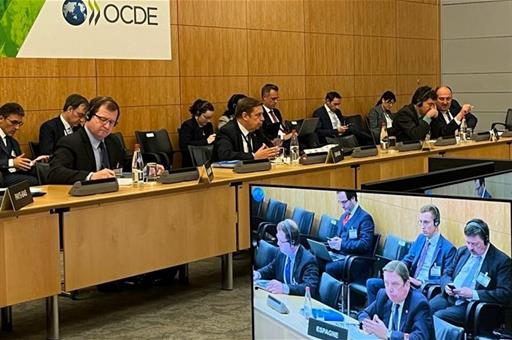Luis Planas advocates maintaining agricultural exports from Ukraine to facilitate global food security
News - 2022.11.3
Minister Luis Planas defended the need to reinforce measures that favour the export of agricultural products from Ukraine, especially cereals, to ensure food supplies to the population, and especially to developing countries, which are more vulnerable to the instability caused by the war.
During the meetings held in the framework of the ministerial meeting of the OECD's Agriculture Committee, Planas highlighted the important step forward of Russia's announcement of the extension of the agreement to take grain out of Ukraine in ships from the Black Sea, which was initially due to expire on 31 October. As of that date, 9.5 million tonnes of Ukrainian agricultural products, mainly maize, wheat and barley, had been exported.
The minister insisted that it is a priority for international markets to remain open to promote food security in the world, assuring that Spain will support all initiatives adopted by international organisations to guarantee this. He pointed out that for measures to be sensible and sound, transparency and exchange of information on sowing, harvesting and grain stock estimates need to be strengthened. This, he said, would prevent speculative movements and curb price volatility and the consequent increase in production costs, one of the most destabilising effects of the Russian invasion of Ukraine.
Luis Planas has expressed concern about the high prices of fertilisers due to their dependence on gas, which makes it difficult to maintain production in the European Union. The minister advocated the need for measures to facilitate the availability of these products to farmers, to promote a more efficient use of them and to look for other fertilisation alternatives.
In his speech to the plenary, Luis Planas alluded to challenges such as halting the depopulation affecting large rural areas in OECD countries, for which he advocated the development of resilient, sustainable and profitable agriculture and food systems. To achieve these objectives, he considers it essential to strengthen public policies in favour of generational renewal and gender mainstreaming at all stages and levels of rural development actions.
He also stressed the importance of knowledge and digitalisation in moving towards more modern, efficient and technology-based food production. In this move towards sustainability, Planas referred to Spain's efforts to reduce water consumption through the use of non-conventional sources, such as reused or desalinated water and more efficient irrigation systems with lower energy costs.
Today, Luis Planas, who has already held a bilateral meeting with the Turkish Minister of Agriculture and Forestry, Vahit Kirisci, whom he thanked for Turkey's work and efforts to keep the maritime transit of cereal ships open from Ukrainian ports to guarantee food security, will also hold meetings with the Israeli Minister of Agriculture and Rural Development, Oded Forer, and the Canadian Minister of Agriculture and Food, Marie-Claude Bibeau.
During the meetings, in addition to discussing the strengthening of agricultural cooperation between the two countries and Spain, the minister spoke about agricultural insurance, a tool that protects the income of farmers and livestock breeders in the event of adverse climatic phenomena, a policy in which Spain is an international benchmark.
Likewise in a context of climate change, the minister pointed out the need and obligation to commit to sustainable and efficient irrigation and to ensure the preservation of a scarce resource such as water, while guaranteeing food production. Emphasis was also placed on the desirability of promoting agricultural production by boosting the cooperative model, which in Spain has some 3,500 companies very closely linked to the rural environment.
The Paris meeting, which is being held under the theme "Building sustainable agriculture and food systems in a changing environment: shared challenges, transformative solutions", is being attended by some 50 ministers from countries outside the OECD. The dominant theme of the meeting is the crisis situation and the risk to food security posed by the war in Ukraine, which is why the sharing of ideas for solutions is one of the main themes of the sessions. The current situation is also marked by severe droughts in Europe, China and North America, an issue that ties in with the main theme of the meeting, how to tackle climate change through agricultural policies.
Non official translation





